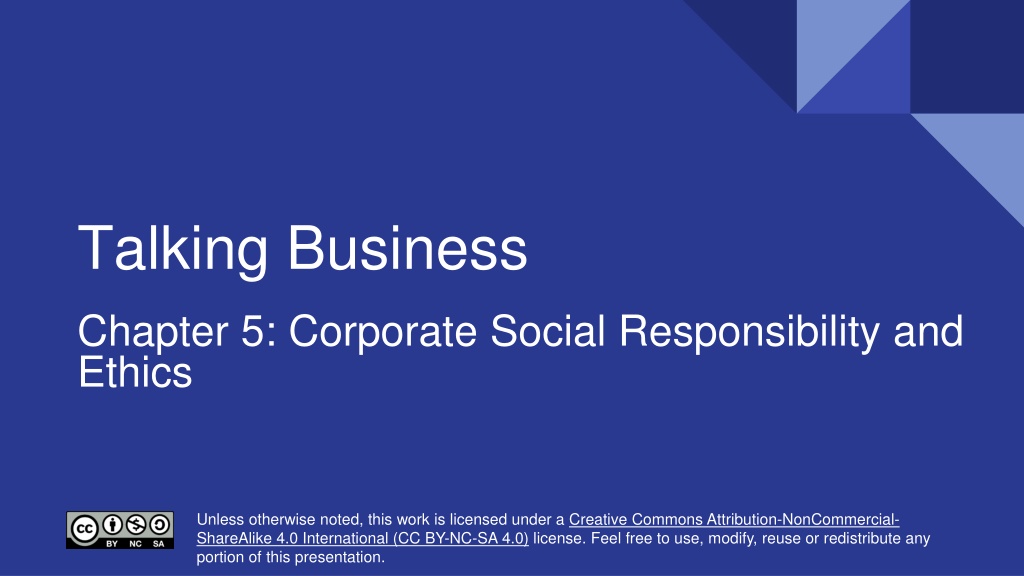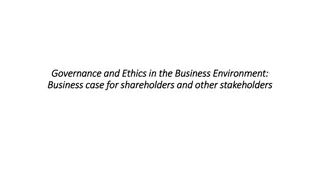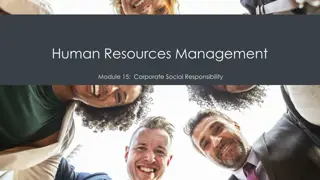Understanding Business Ethics and Corporate Social Responsibility
Exploring the concepts of business ethics and corporate social responsibility, this chapter delves into the importance of ethical standards, recognizing unethical business activities, and the influence of organizations on ethical conduct. It covers philosophies shaping personal ethical standards, ways to encourage ethical behavior, and how businesses meet their social responsibilities.
Download Presentation

Please find below an Image/Link to download the presentation.
The content on the website is provided AS IS for your information and personal use only. It may not be sold, licensed, or shared on other websites without obtaining consent from the author. Download presentation by click this link. If you encounter any issues during the download, it is possible that the publisher has removed the file from their server.
E N D
Presentation Transcript
Talking Business Chapter 5: Corporate Social Responsibility and Ethics Unless otherwise noted, this work is licensed under a Creative Commons Attribution-NonCommercial- ShareAlike 4.0 International (CC BY-NC-SA 4.0) license. Feel free to use, modify, reuse or redistribute any portion of this presentation.
Learning Outcomes At the end of this chapter, learners will be able to: Outline the philosophies and concepts that shape personal ethical standards. Discuss ways that organizations can encourage ethical business behavior. Define corporate social responsibility. Describe how businesses meet their social responsibilities. Discuss the trends in ethics and corporate social responsibility.
5.1 Understanding Business Ethics Ethics is a set of moral standards for judging whether something is right or wrong. The first step in understanding business ethics is learning to recognize an ethical issue. Photo by Tumisu, Pixabay License
5.1 Understanding Business Ethics Recognizing Unethical Business Activities 1. Taking things that don t belong to you. 2. Saying things you know are not true. 3. Giving or allowing false impressions. 4. Buying influence or engaging in a conflict of interest. 5. Hiding or divulging information. 6. Taking unfair advantage. 7. Committing improper personal behaviour. 8. Abusing power and mistreating individuals. 9. Permitting organizational abuse. 10. Violating rules. 11. Condoning unethical actions.
5.1 Understanding Business Ethics Justice The Question of Fairness Another factor influencing individual business ethics is justice, or what is fair according to prevailing standards of society. Utilitarianism Seeking the Best for the Majority One of the philosophies that may influence choices between right and wrong is utilitarianism, which focuses on the consequences of an action taken by a person or organization. Following Our Obligations and Duties The philosophy that says people should meet their obligations and duties when analyzing an ethical dilemma is called deontology. Individual Rights The term human rights implies that certain rights to life, to freedom, to the pursuit of happiness are bestowed at birth and cannot be arbitrarily taken away.
5.2 How Organizations Influence Ethical Conduct People choose between right and wrong based on their personal code of ethics. They are also influenced by the ethical environment created by their employers. Photo by Gerd Altmann, Pixabay License
5.2 How Organizations Influence Ethical Conduct An Ethical Dilemma used for Employee Training Bill Gannon was a middle manager of a large manufacturer of lighting fixtures in Newark, New Jersey. Bill had moved up the company ladder rather quickly and seemed destined for upper management in a few years. Bill s boss, Dana Johnson, had been pressuring them about the semi-annual reviews concerning Robert Talbot, one of Bill s employees. Dana, it seemed, would not accept any negative comments on Robert s evaluation forms. Bill had found out that a previous manager who had given Robert a bad evaluation was no longer with the company. As Bill reviewed Robert s performance for the forthcoming evaluation period, they found many areas of subpar performance. Moreover, a major client had called recently complaining that Robert had filled a large order improperly and then had been rude to the client when she called to complain. Leading by Example Offering Ethics Training Programs Establishing a Formal Code of Ethics Making the Right Decision The Feelings Test The Newspaper or Social Media Test 1. Discussion Questions What ethical issues does the situation raise? 2. What courses of action could Bill take? Describe the ethics of each course. 3. Should Bill confront Dana? Dana's boss? 4. What would you do in this situation? What are the ethical implications? An Ethical Dilemma Used for Employee Training
5.3 Managing a Socially Responsible Business What is corporate social responsibility? Acting in an ethical manner is one of the four components of the pyramid of corporate social responsibility (CSR), which is the concern of businesses for the welfare of society as a whole. CSR is voluntary the obligations of corporate social responsibility are broad Photo by Mary Pahlke, Pixabay License
5.3 Managing a Socially Responsible Business Understanding Social Responsibility Illegal and Irresponsible Behaviour Irresponsible but Legal Behaviour Legal and Responsible Behaviour Figure 5.1 Corporate Responsibility
5.4 Responsibilities to Stakeholders How do businesses meet their social responsibilities to various stakeholders? What makes a company be admired or perceived as socially responsible? Photo by Gerd Altmann, Pixabay License
5.4 Responsibilities to Stakeholders Stakeholders are the individuals or groups to whom a business has a responsibility. The stakeholders of a business are its employees, its customers, the general public, and its investors. Responsibility to Employees Responsibility to Customers Responsibility to Society Environmental Protection Corporate Philanthropy Responsibilities to Investors
5.5 Trends in Ethics and Corporate Social Responsibility Three important trends related to ethics and corporate social responsibility are: 1. Strategic changes in corporate philanthropy 2. A new social contract between employers and employees 3. The growth of global ethics and corporate social responsibility Photo by Credit Commerce, Pixabay License
Reflection Activity Returning to the situation Abe is in at the beginning of the chapter, what advice would you provide to Abe now that you have read the chapter? Should Abe help Martin make the photocopies?























